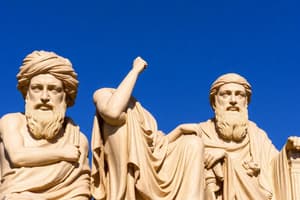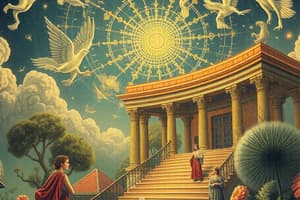Podcast
Questions and Answers
What is the significance of 'logos' in Greek thought?
What is the significance of 'logos' in Greek thought?
- It signifies the emotional aspects of life.
- It involves a rational explanation for mythological beliefs. (correct)
- It represents the harmony of the universe.
- It suggests a purely material perspective on existence.
What is the primary concept proposed by Thales regarding the origin of everything?
What is the primary concept proposed by Thales regarding the origin of everything?
- Everything originates from fire.
- Everything is derived from air.
- Everything is water-derived. (correct)
- Everything comes from an indefinable essence.
Which philosopher proposed that everything comes from the 'apeiron' or boundless essence?
Which philosopher proposed that everything comes from the 'apeiron' or boundless essence?
- Anaximander (correct)
- Anaximenes
- Thales
- Archimedes
How does Hesiodus contribute to Greek thought?
How does Hesiodus contribute to Greek thought?
What does Anaximenes attribute as the fundamental element of everything?
What does Anaximenes attribute as the fundamental element of everything?
What concept is associated with Herakleitos?
What concept is associated with Herakleitos?
According to Parmenides, which statement best describes his view on reality?
According to Parmenides, which statement best describes his view on reality?
Which statement aligns with the Pythagorean philosophy?
Which statement aligns with the Pythagorean philosophy?
What does the term logos refer to in the context of the presented philosophies?
What does the term logos refer to in the context of the presented philosophies?
How do qualitative descriptions differ from quantitative descriptions?
How do qualitative descriptions differ from quantitative descriptions?
What is the primary focus of Sophists in philosophy?
What is the primary focus of Sophists in philosophy?
What is the significance of logos in the context of Sophism?
What is the significance of logos in the context of Sophism?
According to Protagoras, how is knowledge perceived?
According to Protagoras, how is knowledge perceived?
Which statement best reflects the concept of relativism as presented by Protagoras?
Which statement best reflects the concept of relativism as presented by Protagoras?
What shift occurred in philosophy with the advent of Sophists?
What shift occurred in philosophy with the advent of Sophists?
What is emphasized as a central concept in the discussion of knowledge?
What is emphasized as a central concept in the discussion of knowledge?
How does the document describe the relationship between theoretical and practical knowledge?
How does the document describe the relationship between theoretical and practical knowledge?
Which philosophical viewpoint is mentioned as an important consideration in the text?
Which philosophical viewpoint is mentioned as an important consideration in the text?
What concept is contrasted with absolute truths in the document?
What concept is contrasted with absolute truths in the document?
Which philosophers are referenced regarding their relevance to knowledge and practicality?
Which philosophers are referenced regarding their relevance to knowledge and practicality?
What does the text suggest about knowledge and its application in real-world situations?
What does the text suggest about knowledge and its application in real-world situations?
What idea is explored regarding interconnected knowledge?
What idea is explored regarding interconnected knowledge?
What aspect of philosophical thought does the text highlight as an evolution?
What aspect of philosophical thought does the text highlight as an evolution?
Flashcards are hidden until you start studying
Study Notes
Introduction to Philosophy
- Origin of Philosophy:
- Philosophy began with wondering, describing, inquiring, and understanding the world.
- People try to understand things in their own special way, gaining insight in the process.
Greek Thought
-
Language of Philosophy:
- "My + Logos" (my thesis) -> Gods World
- "Logos" refers to reason and understanding.
-
Hesiodus:
- Rationalized mythological gods with the concept of "Logos" (reason), and "Telos"(purpose). This created a narrative of the world, reducing the belief in gods as creators.
Investigative Philosophers / Presocratic Philosophy
- Ionia:
- Concept of Being:
- Thales: Proposed that everything is derived from water.
- Anaximenes: Believed air was the fundamental element.
- Anaximander: Introduced the concept of "apeiron" (boundless, indefinable essence). This proposed that everything comes from a fundamental element.
- Concept of Being:
The Pythagoreans
- The Order of the Cosmos:
- Focused on understanding the cosmos through measurement.
- Believed in the unity of all existence, and assigned numbers to different elements.
Herakleitos
- Unity of Opposites:
- Focused on the unity of opposing forces and the constant change of all things.
- Believed in the interaction of laws that create harmony within change.
Parmenides vs. Elea
-
Change and Being:
- Parmenides: Believed "being is, non-being is not," suggesting that change is an illusion.
- Elea: Believed that "everything flows, nothing stays," emphasizing the constant state of flux in the world.
-
Laws and Harmony:
- Believed that laws are the driving force behind change and strive toward harmony.
Sofisten and Socrates
-
Shift in Focus:
- Natural Philosophers focused on explaining the universe.
- Sophists and Socrates focused on humans as thinking and desiring beings.
-
This shifted the core of philosophy towards ethics and political philosophy.
-
Change in Explanation:
- Moved from mythological explanations to argumentative, rational explanations (due to the rise of democracy, public speaking, and the need for justification).
-
The Promise of Knowledge:
- Sophists promised knowledge and formation to legitimize and enhance their own status.
- Their goal was to use argumentation to persuade others, regardless of absolute truth.
-
Means of Power:
- Sophists used "Logos" (reason) and rhetoric as means of power.
- This practice questioned the pursuit of "truth" by Plato and Aristotle.
Protagoras
-
Subjectivity of Knowledge:
- Rejected the existence of absolute truth.
- Believed that knowledge is based on personal perceptions, needs, and viewpoints, which are constantly evolving.
- This fostered a need to persuade people to adopt their own perspective.
-
Relativism:
- Believed that the meaning of concepts like "truth" and "beauty" is relative.
- These qualities are subjective and contingent on individual experiences and perspectives.
Philosophical Inquiry Regarding Knowledge and Practicality
-
Theoretical vs. Practical Knowledge:
- Explores the relationship between theory ("theoretische") and practical application ("praktische").
- Asks how theoretical knowledge can be relevant and useful in daily life.
-
The Role of "Kennis" (Knowledge):
- Knowledge is considered central, but absolute truth can be a limiting factor in understanding daily complexities.
-
Evolution of Though:
- Highlights the evolution of understanding about goodness and virtue over time.
- Refers to different philosophical viewpoints, such as pragmatism.
-
Practicality and Truth:
- Knowledge is only valuable when it is tested and proven in real-world situations.
-
Philosophers:
- Questions the relevance of Plato and Socrates in the modern world.
-
Central Subject:
- The focus is on the "central subject" of study and its application.
-
Absolute vs. Evolving Truths:
- Emphasizes the differences between absolute truths versus the continuous evolution of understanding.
-
Interconnected Knowledge:
- Highlights how knowledge is interconnected, how perspectives evolve, and how this understanding can be used effectively in various situations.
-
Pragmatism:
- A philosophical approach that bases knowledge on its practical use.
Studying That Suits You
Use AI to generate personalized quizzes and flashcards to suit your learning preferences.




